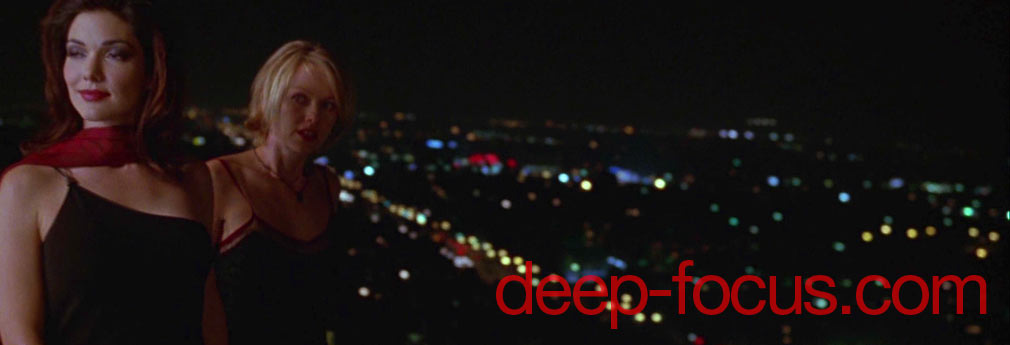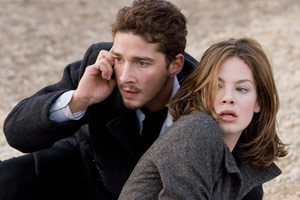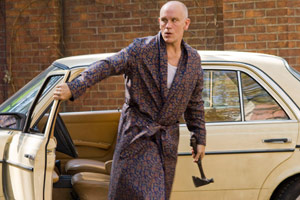Recently in DVD Traffic Report Category
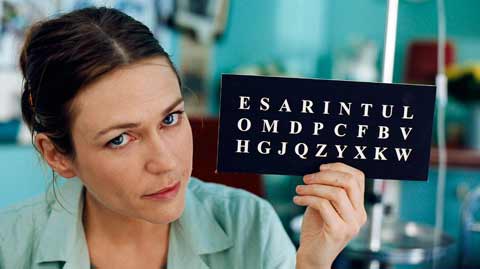
The Diving Bell and the Butterfly (Miramax)
Following a stroke that paralyzed him nearly completely, Jean-Dominique Bauby wrote his memoir, The Diving Bell and the Butterfly, by listening to a bedside assistant read out all the letters of the alphabet and blinking each time she reached the correct one. This film is about the metaphor described in the book's title--Bauby's ruined body is like a diving bell, keeping him from interacting with the world outside, but his still-agile imagination is more like a butterfly. Director Julian Schnabel is a painter-turned-filmmaker who approaches the matter with an artist's instinct for aesthetics, and the film's first half-hour or so is a tour de force. Cinematographer Janusz Kaminski, known for his work with Steven Spielberg, creates a first-person experience full of both beauty and terror, imagining what the world must have looked like to Bauby in those first few days after he came out of his coma. The rest of the film, including flashbacks and fantasy sequences that amount to a contemporary take on Fellini's 8 1⁄2, is more ordinary (a tearful Max Von Sydow is excellent in what amounts to a cameo), but Mathieu Amalric gives life to Bauby's clear-eyed, life-affirming prose in an expert voiceover. (Related: Julian Schnabel in Pleasantville) Originally published in the White Plains Times.
Buy it from Amazon.com: The Diving Bell and the Butterfly
Charlie Wilson’s War is a rare thing—a funny political film, a sexy history lesson. Director Mike Nichols brings a light comic touch to the story of the Democratic Texas Congressman (Tom Hanks) with a thing for the ladies and a soft spot for the Mujahideen in Afghanistan. Julia Roberts plays the wealthy conservative socialite who convinces Wilson to orchestrate the covert diversion of hundreds of millions of dollars to the Afghan rebels in the years following the Soviet invasion in 1979. Neither Hanks nor Roberts is particularly convincing as a Texas politico, but that’s OK. The film crackles whenever Philip Seymour Hoffman, playing CIA agent Gust Avrakotos, comes on screen, ripping mischievously through his sardonic dialogue and bringing everyone else’s game up a notch. Adapted from a book by the late George Crile, Aaron Sorkin's screenplay strongly suggests that the Congressional failure to help rebuild Afghanistan’s decimated post-war infrastructure helped make that country an eventual hotbed of terrorist activity. But what sticks is the criticism of U.S. politics as essentially a popularity contest, driven by friendships, favors, and fickle public opinion—a system prone to leave jobs unfinished as they become unfashionable. Originally published in the White Plains Times.
Buy it from Amazon.com: Charlie Wilson's War (Widescreen)
Easy Living (Universal)
Preston Sturges began his career at Paramount in 1937 by writing this Depression-era-New-York comedy about a wealthy industrialist (Edward Arnold) known as The Bull of Broad Street, his unhappy son (Ray Milland) who leaves home to work as a busboy at an automat, and working girl Mary Smith (Jean Arthur), whose life changes after a crazy-expensive fur coat chucked off the roof of a Manhattan apartment building lands on her head. (She turns around, angrily, and demands, "What's the big deal anyway?" The turbaned dude behind her responds, deadpan, "Kismet." It's that kind of screenplay.) Turns out the coat is a powerful status symbol, and Mary soon learns that nothing attracts wealth as powerfully as, well, more wealth. The no-frills slapstick of director Mitchell Leisen (an accomplished art director and costume designer) is no substitute for the elegance that Sturges would later develop helming his own material, but it's fairly well-tuned for this sophisticated, breezily entertaining farce of misunderstood identities. And Jean Arthur is terrific. I'm not sure how good the DVD looks, but it's got to be better than my VHS copy, which was recorded from Showtime almost 20 years ago.
Buy it from Amazon.com: Easy Living (Universal Cinema Classics)
 Juno (Fox)
Juno (Fox)Yes, it's absolutely crazy that this was nominated for Best Picture. Still, Juno is a pretty good time, elevated by the wry comic performance at its center—the 20-year-old Ellen Page delivers an endless succession of one-liners like she’s just vocalizing every colorfully sarcastic, occasionally scabrous thought that pops into her head. It’s a breakout performance that humanizes a script by erstwhile stripper (but you knew that) Diablo Cody that’s just a little too reliant on clever verbiage to create completely credible characters. Page plays Juno, a newly pregnant 16-year-old who, appalled by her visit to the local abortion clinic, decides to carry her baby to term. The first two-thirds is played for laughs, contrasting Juno's air of worldliness with the gentle confusion of her boyfriend (Michael Cera of Superbad) and the quiet desperation of the young couple (Jennifer Garner and Jason Bateman) seeking to adopt. In the third act, the air of hipness dissipates and Juno becomes just the story of a girl who knows she’s in over her head and tries her best to do the right thing. Songs from the likes of The Moldy Peaches, Belle and Sebastian and even The Velvet Underground amplify the feeling of twee folksiness, but the emotions are, finally, honest and complex. A version of this review originally appeared in The White Plains Times.

Manda Bala: Send a Bullet (City Lights Video)
First-time filmmaker Jason Kohn's documentary about life amidst the violence, poverty, and pervasive corruption of urban Brazil is frighteningly easy to watch — he shot on 16mm film using anamorphic lenses that stretch the image to an eye-popping ratio somewhere to the wide side of Cinemascope, and cinematographer Heloísa Passos ably captures a range of images that include the unfortunate amphibians inhabiting an overstuffed frog farm, the drably colorful favelas of Säo Paolo, and the too-colorful cosmetic-surgery procedure that's put to use in oder to replace the ears torn from kidnap victims by their abductors. Set largely to the urgent, jazzy stylings of tropicalia music from artists including Tom Zé and Gilberto Gil, Kohn's vignettes eventually cohere in a patchwork portrait of a country under siege by the twin threats of violent crime and the shenanigans of corrupt politicians whose money-laundering schemes fuel the kind of economic disparity that creates lower-class desperados. There's something to be said for chutzpah, and you can't accuse Kohn of laziness — the film includes a low-key confrontation with Jader Barbalho, the villain of the piece, and a nervy interview with one of the masked gunmen who makes a living dealing drugs and snatching members of the upper classes, securing their (mostly) safe return in exchange for money he claims to re-invest in his community. Kohn has been criticized for a certain sensationalism in his approach, and it's true that Manda Bala is a nonfiction film with the sensibility of pulp fiction. (Its gangster-movie tone actually reminded me a bit of the similarly in-your-face City of God.) But Kohn doesn't claim that he's trying to change the world. This is more of an essay film — a colorful, eyes-wide-open trip through the cities and slums of Brazil with a gutsy young filmmaker who's poking around to find ways to illustrate the connections between crooked politics and systemic violence. The ride more than repays the time you put into it — but it's an ultimately pessimistic trip that's unlikely to make you feel any better about the wide world outside.
Buy it from Amazon.com: Manda Bala
 There Will Be Blood (Paramount)
There Will Be Blood (Paramount)The movie that finally turned me into a P.T. Anderson fan is even better on a second viewing, and if the inevitable high-definition home-video version hadn't fallen through the cracks created by the implosion of HD DVD, I'd be ready for a third go-round, like, tonight. Home video isn't the perfect environment for the fiery visuals of this grim descent, spectacularly photographed in widescreen by Robert Elswit. It may, however, be a good place to appreciate the score by Jonny Greenwood; it sounds radical enough as film music to make me frustrated by the moribund, this-is-how-we-feel-now style of too many composers, who labor in the long shadow of movie-music kingpin Johnny Williams and his work on behalf of the Lucas-Spielberg syndicate. (Not to knock John Williams, who has done some pretty solid work, but his success in a very familiar, "neo-romantic" mode has established a kind of hegemony in mainstream movies.)
Buy it from Amazon.com: There Will Be Blood

Sweeney Todd: The Demon Barber of Fleet Street (Dreamworks)
Tim Burton may not seem like the ideal adapter of a Stephen
Sondheim musical, but when you consider the wry ghoulishness of this
throat-slashing tragedy, the aptness of
Buy it from Amazon.com: Sweeney Todd - The Demon Barber of Fleet Street![]() or Sweeney Todd - The Demon Barber of Fleet Street (Two-Disc Special Collector's Edition)
or Sweeney Todd - The Demon Barber of Fleet Street (Two-Disc Special Collector's Edition)![]()
 Bonnie and Clyde (Warner)
Bonnie and Clyde (Warner)I wasn't around for its release, so I don't know what it felt like to see it contemporaneously, but Bonnie and Clyde has gained a deserved reputation as the first of a new type of Hollywood film — one that revels in the outlaw appeal of the sociopath and depicts brutal violence frankly and with some degree of relish. The generally wrong-headed Bosley Crowther attacked it at the time ("... Bonnie and Clyde does not impress me as a contribution to the thinking of our times or as wholesome entertainment") and the Times was still harrumphing about its glamorization of violence as recently as last August, when A.O. Scott furrowed his brow in retrospect ("... in some ways that matter and that have become too easy to dismiss, Bosley Crowther was right"). Elaine Lennon's piece for Senses of Cinema is an insanely anecdote-packed précis on the film, including a representative sample of critical reaction that hints at what really was at stake at the downtown movie house in the late 1960s. If you've missed it to date, or are ready to stage your own private revival, a new multiplicity of home-video versions is out today.
Buy it from Amazon.com: Bonnie and Clyde (Two-Disc Special Edition), Bonnie and Clyde - Ultimate Collector's Edition, or Bonnie and Clyde [Blu-ray]
The Ice Storm (Criterion)
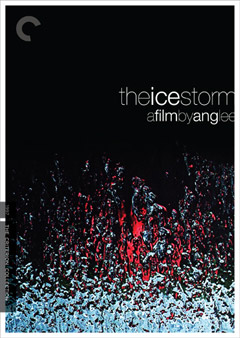 Director Ang Lee followed up his mainstream-American breakthrough — the foreign-language Crouching Tiger, Hidden Dragon — with first a superhero movie (The Hulk) and then a gay cowboy film (Brokeback Mountain), which should demonstrate enough range for anybody. Back in the day, he was a bright light on the indie-film scene, an uncommonly sensitive and expressive Taiwanese director making his English-language debut in Jane Austen territory, with Sense and Sensibility, and then following it up with an arguably even-more-diffficult Rick Moody adaptation, The Ice Storm. All about the swinging suburban middle class in the early 1970s — sexually restless housewives and husbands and their bored children — The Ice Storm might have seemed like a presumptuous choice for a director born and raised in Taiwan, but it turns out that Lee knows a thing or two about the suburbs. (He moved to Westchester County, just north of New York City, more than 20 years ago.) With The Ice Storm, Lee able handled a group of young actors (Tobey Maguire, Christina Ricci, Elijah Wood) and elicited what's possibly a career-best performance from Joan Allen. He also nailed a specific sense of time and place, and uncovered the almost mournful emotional heart of the story. It's a little creepy, a little heartbreaking, and a little otherworldly.
Director Ang Lee followed up his mainstream-American breakthrough — the foreign-language Crouching Tiger, Hidden Dragon — with first a superhero movie (The Hulk) and then a gay cowboy film (Brokeback Mountain), which should demonstrate enough range for anybody. Back in the day, he was a bright light on the indie-film scene, an uncommonly sensitive and expressive Taiwanese director making his English-language debut in Jane Austen territory, with Sense and Sensibility, and then following it up with an arguably even-more-diffficult Rick Moody adaptation, The Ice Storm. All about the swinging suburban middle class in the early 1970s — sexually restless housewives and husbands and their bored children — The Ice Storm might have seemed like a presumptuous choice for a director born and raised in Taiwan, but it turns out that Lee knows a thing or two about the suburbs. (He moved to Westchester County, just north of New York City, more than 20 years ago.) With The Ice Storm, Lee able handled a group of young actors (Tobey Maguire, Christina Ricci, Elijah Wood) and elicited what's possibly a career-best performance from Joan Allen. He also nailed a specific sense of time and place, and uncovered the almost mournful emotional heart of the story. It's a little creepy, a little heartbreaking, and a little otherworldly.No Country for Old Men (Miramax)
No Country For Old Men is, probably, the single most critically lauded film of the Coen Brothers' career. It's also a departure, especially in that it largely subjugates their own exhibitionist hallmarks of style and characterization to those established in the source material – in this case an expertly grim genre potboiler by Cormac McCarthy. No Country gets great benefits from the outstanding performances at its center – Javier Bardem's cold-blooded killer the kind of outsized stereotype that self-identifies as a Coen creation, but paying dividends in counterpoint to Josh Brolin's quiet desperado and Tommy Lee Jones's mournful good-ol-boy sheriff. I was yanked out of the story when vibe-busting reminders of the old-school Coen Brothers' schtick appeared on screen, especially the straight-out-of-central-casting types who inhabit the film's smaller speaking parts – the motel clerk who woodenly insists Brolin select from a menu of room choices, the mama who dodders through her scenes like a Spike Jonze Jackass parody of the elderly, and even the gas-station proprietor whose highly directed performance almost wrecks that crucial early, mood-setting scene with Chigurh. In a broad comedy like the wonderful paean to country folk and bluegrass O Brother Where Art Thou or the bountiful ode to stoner lifestyles The Big Lebowski, they'd be welcome, maybe even show-stealers. But juxtaposed with No Country's sad-eyed hero performances, they feel forced, inauthentic, even (here's that accusation so often lobbed at the Coens) crudely condescending. That's not to say that the Coens' style is a liability; they make consistently smart decisions in condensing and adapting McCarthy's novel, especially when it comes to packing the gist of Ed Tom Bell's lengthy monologues from the printed page into snatches of dialogue on screen. They work the story for suspense, fully exploiting the conventions of crime drama in a narrative (McCarthy's) that, eventually, deliberately flouts genre convention to terminate in a meditation on aging and mortality and maybe nostalgia. And they invent a scene that has the sheriff and the killer coming almost eyeball to eyeball across the portal of a motel-room door with a blasted-out lock cylinder, their simultaneous proximity and distance a necessarily cinematic expression that vaults beyond the source material. But the irony remains: two of our greatest cinema stylists have made the most critically lauded film of their career by ruthlessly corseting their formidable drive and vision into the literary strictures dictated by a great American novel. Seeing it a second time, at home, the melancholy grandeur of the film's final cut to black became even more apparent — reassurance that I wasn't simply bowing to conventional wisdom by placing it on my top-10 list. No Country For Old Men is a triumph for sure. But for the Coens, it's also something of a capitulation.
Buy it from Amazon.com: No Country for Old Men or No Country for Old Men [Blu-ray]

Into the Wild (Paramount Vantage)
I guess I like this more than No Country For Old Men partly because it's markedly more personal in its execution. While No Country's exacting genre mechanics can feel overly mechanical, Into the Wild has a relaxed, freewheeling energy and a sensuousness that's rare enough in contemporary Hollywood to seem noteworthy when it occurs. The performances are uniformly dedicated -- sure, old guy Hal Holbrook deserved the end-of-year love he got, but not any more so than overlooked co-thesps Emile Hirsch, Catherine Keener, and even Vince Vaughn. The cinematography is a marvelous example of its type, and skillful editorial work helps Penn keep the momentum going throughout an expansive running time. Here's what I wrote at the time: "As accomplished as the photography is, what's even more glorious about Into the Wild is its essential messiness." It'll be reduced on a small screen, but undoubtedly worth the sit — maybe it'll find the wide audience on DVD that eluded it in theaters.
Buy it from Amazon.com: Into the Wild or Into the Wild (Two-Disc Special Collector's Edition)
